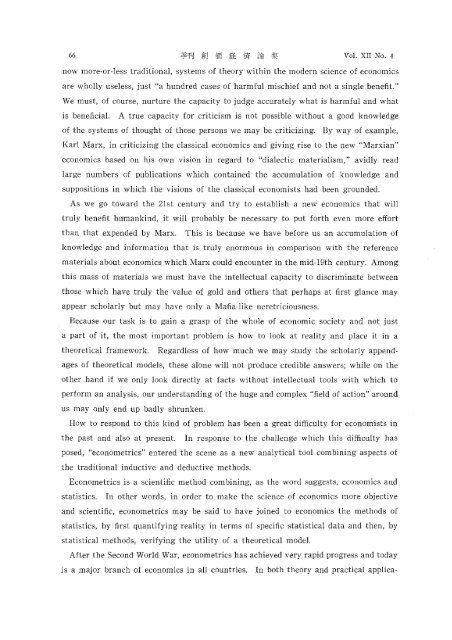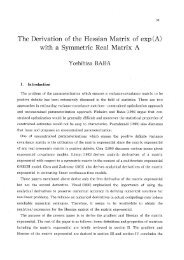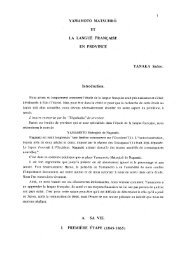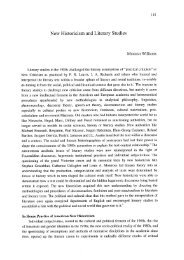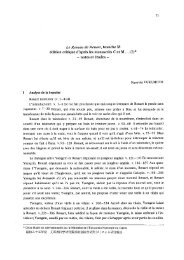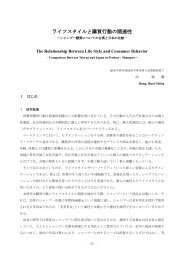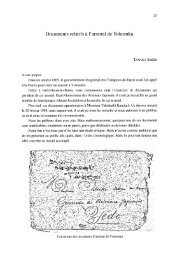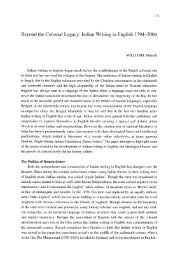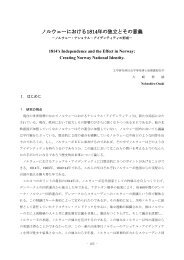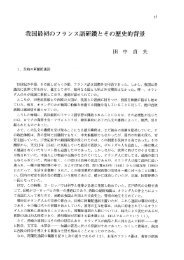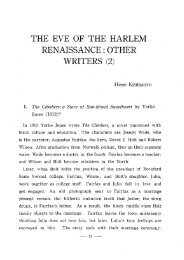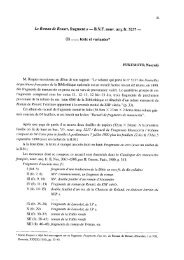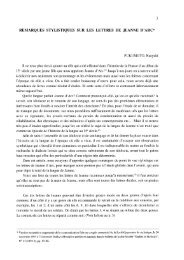vision and methodology in the new economics of global ...
vision and methodology in the new economics of global ...
vision and methodology in the new economics of global ...
Create successful ePaper yourself
Turn your PDF publications into a flip-book with our unique Google optimized e-Paper software.
66 FIJ AIJ Jj F { p Vol. XII No. 4<br />
now more-or-less traditional, systems <strong>of</strong> <strong>the</strong>ory with<strong>in</strong> <strong>the</strong> modern science <strong>of</strong> <strong>economics</strong><br />
are wholly useless, just "a hundred cases <strong>of</strong> harmful mischief <strong>and</strong> not a s<strong>in</strong>gle benefit."<br />
We must, <strong>of</strong> course, nurture <strong>the</strong> capacity to judge accurately what is harmful <strong>and</strong> what<br />
is beneficial. A true capacity for criticism is not possible without a good knowledge<br />
<strong>of</strong> <strong>the</strong> systems <strong>of</strong> thought <strong>of</strong> those persons we may be criticiz<strong>in</strong>g. By way <strong>of</strong> example,<br />
Karl Marx, <strong>in</strong> criticiz<strong>in</strong>g <strong>the</strong> classical <strong>economics</strong> <strong>and</strong> giv<strong>in</strong>g rise to <strong>the</strong> <strong>new</strong> "Marxian"<br />
<strong>economics</strong> based on his own <strong>vision</strong> <strong>in</strong> regard to "dialectic materialism," avidly read<br />
large numbers <strong>of</strong> publications which conta<strong>in</strong>ed <strong>the</strong> accumulation <strong>of</strong> knowledge <strong>and</strong><br />
suppositions <strong>in</strong> which <strong>the</strong> <strong>vision</strong>s <strong>of</strong> <strong>the</strong> classical economists had been grounded.<br />
As we go toward <strong>the</strong> 21st century <strong>and</strong> try to establish a <strong>new</strong> <strong>economics</strong> that will<br />
truly benefit humank<strong>in</strong>d, it will probably be necessary to put forth even more effort<br />
than that expended by Marx. This is because we have before us an accumulation <strong>of</strong><br />
knowledge <strong>and</strong> <strong>in</strong>formation that is truly enormous <strong>in</strong> comparison with <strong>the</strong> reference<br />
materials about <strong>economics</strong> which Marx could encounter <strong>in</strong> <strong>the</strong> mid-19th century. Among<br />
this mass <strong>of</strong> materials we must have <strong>the</strong> <strong>in</strong>tellectual capacity to discrim<strong>in</strong>ate between<br />
those which have truly <strong>the</strong> value <strong>of</strong> gold <strong>and</strong> o<strong>the</strong>rs that perhaps at first glance may<br />
appear scholarly but may have only a Mafia-like neretriciousness.<br />
Because our task is to ga<strong>in</strong> a grasp <strong>of</strong> <strong>the</strong> whole <strong>of</strong> economic society <strong>and</strong> not just<br />
a part <strong>of</strong> it, <strong>the</strong> most important problem is how to look at reality <strong>and</strong> place it <strong>in</strong> a<br />
<strong>the</strong>oretical framework. Regardless <strong>of</strong> how much we may study <strong>the</strong> scholarly append-<br />
ages <strong>of</strong> <strong>the</strong>oretical models, <strong>the</strong>se alone will not produce credible answers; while on <strong>the</strong><br />
o<strong>the</strong>r h<strong>and</strong> if we only look directly at facts without <strong>in</strong>tellectual tools with which to<br />
perform an analysis, our underst<strong>and</strong><strong>in</strong>g <strong>of</strong> <strong>the</strong> huge <strong>and</strong> complex "field <strong>of</strong> action" around<br />
us may only end up badly shrunken.<br />
How to respond to this k<strong>in</strong>d <strong>of</strong> problem has been a great difficulty for economists <strong>in</strong><br />
<strong>the</strong> past <strong>and</strong> also at present. In response to <strong>the</strong> challenge which this difficulty has<br />
posed, "econometrics" entered <strong>the</strong> scene as a <strong>new</strong> analytical tool comb<strong>in</strong><strong>in</strong>g aspects <strong>of</strong><br />
<strong>the</strong> traditional <strong>in</strong>ductive <strong>and</strong> deductive methods.<br />
Econometrics is a scientific method comb<strong>in</strong><strong>in</strong>g, as <strong>the</strong> word suggests, <strong>economics</strong> <strong>and</strong><br />
statistics. In o<strong>the</strong>r words, <strong>in</strong> order to make <strong>the</strong> science <strong>of</strong> <strong>economics</strong> more objective<br />
<strong>and</strong> scientific, econometrics may be said to have jo<strong>in</strong>ed to <strong>economics</strong> <strong>the</strong> methods <strong>of</strong><br />
statistics, by first quantify<strong>in</strong>g reality <strong>in</strong> terms <strong>of</strong> specific statistical data <strong>and</strong> <strong>the</strong>n, by<br />
statistical methods, verify<strong>in</strong>g <strong>the</strong> utility <strong>of</strong> a <strong>the</strong>oretical model.<br />
After <strong>the</strong> Second World War, econometrics has achieved very rapid progress <strong>and</strong> today<br />
is a major branch <strong>of</strong> <strong>economics</strong> <strong>in</strong> all countries. In both <strong>the</strong>ory <strong>and</strong> practical applica-


